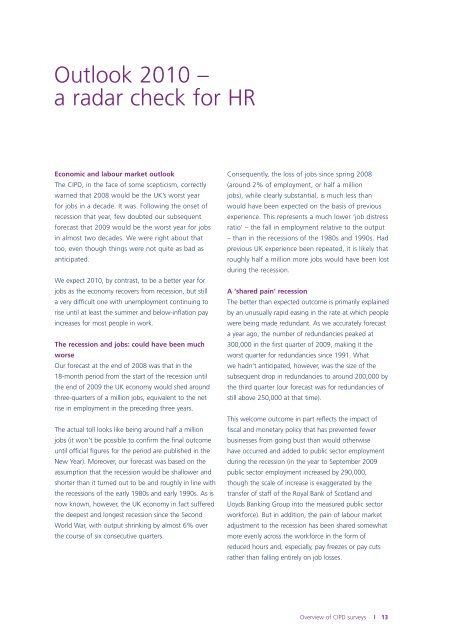A BAROMETER OF HR TRENDS AND PROSPECTS 2010 - CIPD
A BAROMETER OF HR TRENDS AND PROSPECTS 2010 - CIPD
A BAROMETER OF HR TRENDS AND PROSPECTS 2010 - CIPD
Create successful ePaper yourself
Turn your PDF publications into a flip-book with our unique Google optimized e-Paper software.
Outlook <strong>2010</strong> –<br />
a radar check for <strong>HR</strong><br />
Economic and labour market outlook<br />
The <strong>CIPD</strong>, in the face of some scepticism, correctly<br />
warned that 2008 would be the UK’s worst year<br />
for jobs in a decade. It was. Following the onset of<br />
recession that year, few doubted our subsequent<br />
forecast that 2009 would be the worst year for jobs<br />
in almost two decades. We were right about that<br />
too, even though things were not quite as bad as<br />
anticipated.<br />
We expect <strong>2010</strong>, by contrast, to be a better year for<br />
jobs as the economy recovers from recession, but still<br />
a very difficult one with unemployment continuing to<br />
rise until at least the summer and below-inflation pay<br />
increases for most people in work.<br />
The recession and jobs: could have been much<br />
worse<br />
Our forecast at the end of 2008 was that in the<br />
18-month period from the start of the recession until<br />
the end of 2009 the UK economy would shed around<br />
three-quarters of a million jobs, equivalent to the net<br />
rise in employment in the preceding three years.<br />
The actual toll looks like being around half a million<br />
jobs (it won’t be possible to confirm the final outcome<br />
until official figures for the period are published in the<br />
New Year). Moreover, our forecast was based on the<br />
assumption that the recession would be shallower and<br />
shorter than it turned out to be and roughly in line with<br />
the recessions of the early 1980s and early 1990s. As is<br />
now known, however, the UK economy in fact suffered<br />
the deepest and longest recession since the Second<br />
World War, with output shrinking by almost 6% over<br />
the course of six consecutive quarters.<br />
Consequently, the loss of jobs since spring 2008<br />
(around 2% of employment, or half a million<br />
jobs), while clearly substantial, is much less than<br />
would have been expected on the basis of previous<br />
experience. This represents a much lower ‘job distress<br />
ratio’ – the fall in employment relative to the output<br />
– than in the recessions of the 1980s and 1990s. Had<br />
previous UK experience been repeated, it is likely that<br />
roughly half a million more jobs would have been lost<br />
during the recession.<br />
A ‘shared pain’ recession<br />
The better than expected outcome is primarily explained<br />
by an unusually rapid easing in the rate at which people<br />
were being made redundant. As we accurately forecast<br />
a year ago, the number of redundancies peaked at<br />
300,000 in the first quarter of 2009, making it the<br />
worst quarter for redundancies since 1991. What<br />
we hadn’t anticipated, however, was the size of the<br />
subsequent drop in redundancies to around 200,000 by<br />
the third quarter (our forecast was for redundancies of<br />
still above 250,000 at that time).<br />
This welcome outcome in part reflects the impact of<br />
fiscal and monetary policy that has prevented fewer<br />
businesses from going bust than would otherwise<br />
have occurred and added to public sector employment<br />
during the recession (in the year to September 2009<br />
public sector employment increased by 290,000,<br />
though the scale of increase is exaggerated by the<br />
transfer of staff of the Royal Bank of Scotland and<br />
Lloyds Banking Group into the measured public sector<br />
workforce). But in addition, the pain of labour market<br />
adjustment to the recession has been shared somewhat<br />
more evenly across the workforce in the form of<br />
reduced hours and, especially, pay freezes or pay cuts<br />
rather than falling entirely on job losses.<br />
Overview of <strong>CIPD</strong> surveys 13

















